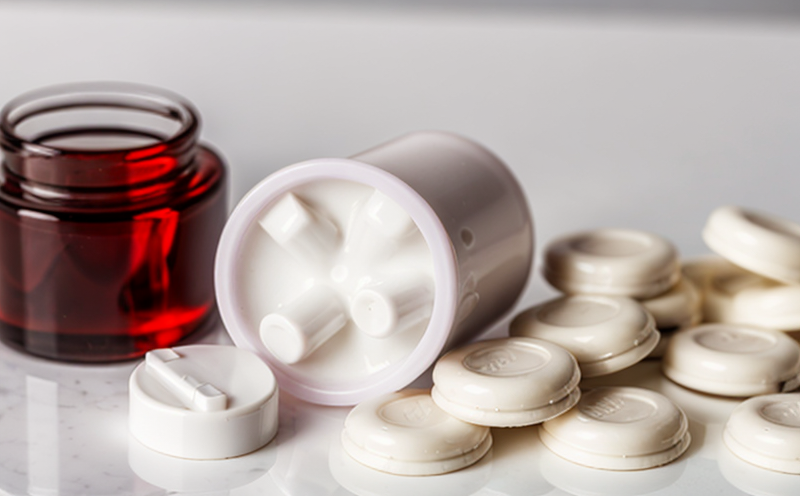USP Buccal Tablet Disintegration Testing
The United States Pharmacopeia (USP) Buccal Tablet Disintegration Test is a critical component of pharmaceutical quality assurance and compliance. This test ensures that the active ingredients within a buccal tablet are released in an acceptable timeframe, which is essential for effective drug delivery. The USP disintegration test evaluates how quickly a tablet breaks down into smaller particles after being placed in water under specified conditions.
The primary objective of this test is to ensure that the tablet’s dissolution profile meets the predefined standards set by regulatory bodies like the USP. This ensures not only the efficacy but also the safety and consistency of the medication, making it suitable for patients who rely on buccal tablets for their treatment.
Disintegration testing is particularly important for buccal tablets because these medications are designed to dissolve quickly in the oral cavity, providing rapid absorption. The test helps identify any potential issues with the formulation that might affect how well the tablet breaks down and releases its active ingredients. For instance, a tablet may pass disintegration tests but not release its drug content adequately within the required time frame.
The USP guidelines specify that the test should be conducted in a controlled environment to ensure consistent results. The temperature is typically maintained at 37°C (98.6°F), and the pH of the water used for testing should be adjusted to 1.2, which simulates acidic conditions found in the stomach.
During the test, the buccal tablet or tablets are placed into a container filled with the appropriate volume of water. The container is then shaken at a specific frequency (usually 50 strokes per minute) for a set duration—typically one hour. During this time, observations are made to note any signs of disintegration.
The success criteria for passing the test include ensuring that all parts of the tablet have broken down into particles smaller than those specified in the USP monograph. If some parts do not meet these criteria after an hour, additional tests may be necessary to determine if there are issues with the formulation or manufacturing process.
Understanding the importance of this test is crucial for pharmaceutical companies and researchers working on buccal delivery systems. It helps them refine formulations, improve drug release mechanisms, and ensure that their products meet stringent regulatory requirements. This not only enhances patient safety but also supports the overall goal of providing effective and reliable medications.
The USP Buccal Tablet Disintegration Test is just one part of a comprehensive quality control process in pharmaceutical manufacturing. By adhering to these standards, manufacturers can maintain high levels of product consistency and efficacy across different batches. This ensures that patients receive the expected therapeutic benefits without delays or complications due to formulation issues.
In conclusion, the USP Buccal Tablet Disintegration Test plays a vital role in ensuring the quality and reliability of buccal tablets. It helps identify potential problems early on, allowing for necessary adjustments before products reach the market. This contributes significantly to maintaining public health standards by providing safe and effective medications that meet regulatory expectations.
Industry Applications
The USP Buccal Tablet Disintegration Test is widely used across various sectors within the pharmaceutical industry, particularly in the development and quality control of buccal tablets. This test ensures that the drug delivery systems are functioning as intended, providing accurate dosages to patients.
- Development Phase: During the early stages of product development, this test helps researchers refine formulations by identifying which excipients or active ingredients might affect disintegration times.
- Manufacturing Process: In production facilities, it is used regularly to monitor batch consistency and detect any variations in manufacturing processes that could impact tablet performance.
- Quality Assurance (QA): QA teams use this test as part of their routine checks to ensure compliance with USP standards. Any discrepancies from the expected results can prompt further investigation into potential issues within the production line.
- Regulatory Compliance: Regulatory bodies like the FDA require pharmaceutical companies to demonstrate adherence to USP guidelines, making disintegration testing a mandatory step in obtaining approval for new products or changes to existing formulations.
The test is especially important for buccal tablets because they are designed to dissolve quickly and release their active ingredients rapidly. Ensuring that these tablets meet the required disintegration times is crucial for effective drug delivery, patient safety, and regulatory compliance.
Customer Impact and Satisfaction
The USP Buccal Tablet Disintegration Test has a direct impact on customer satisfaction by ensuring high-quality products that are safe, effective, and consistent. When manufacturers adhere to these testing protocols, they demonstrate their commitment to delivering reliable medications that perform as expected.
- Improved Patient Outcomes: By guaranteeing that buccal tablets disintegrate properly, the test helps ensure accurate drug delivery to patients. This is particularly important for those relying on rapid absorption of the medication.
- Enhanced Reputation: Consistently meeting USP standards enhances a company’s reputation among healthcare professionals and consumers alike. It signals that they take quality seriously and strive to meet or exceed regulatory expectations.
- Increased Trust: When patients know their medications are tested rigorously according to recognized standards, it fosters trust in both the product and the manufacturer. This can lead to higher customer loyalty and repeat purchases.
- Reduced Risk of Adverse Events: Ensuring proper disintegration minimizes the risk of adverse events such as incomplete drug absorption or irritation caused by non-dissolved components remaining in the oral cavity.
In summary, the USP Buccal Tablet Disintegration Test contributes significantly to enhancing customer satisfaction and trust. It ensures that patients receive effective treatment without unnecessary complications, thereby supporting better health outcomes while also boosting a company’s market position.





